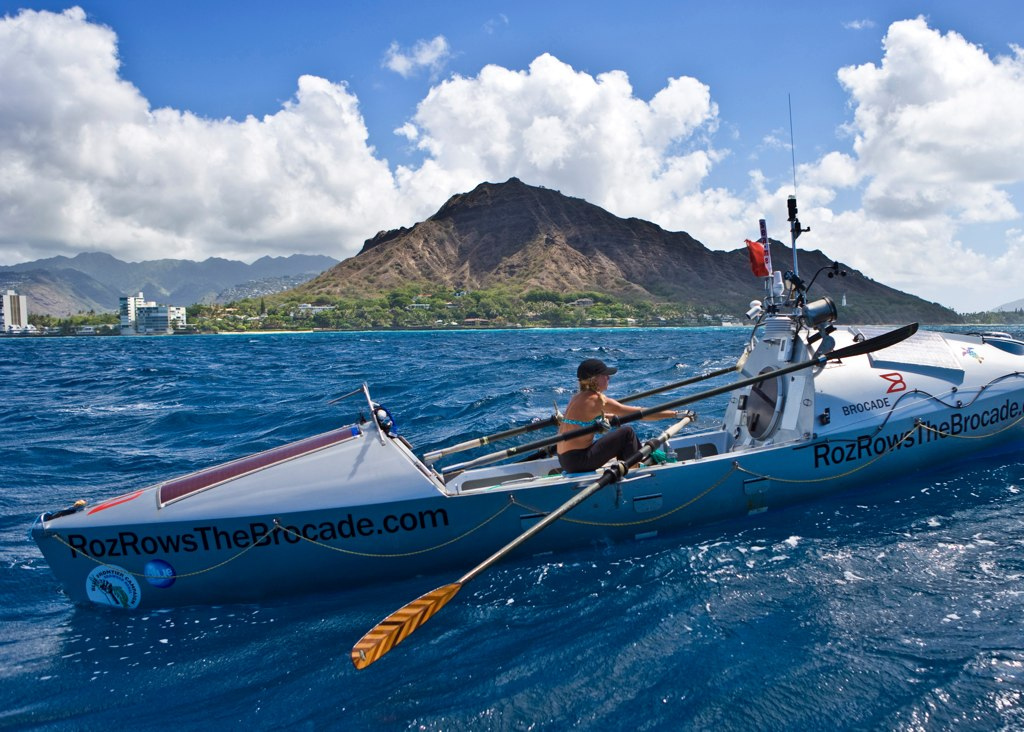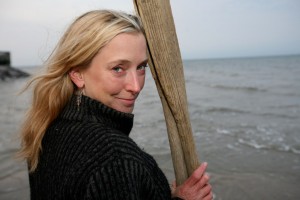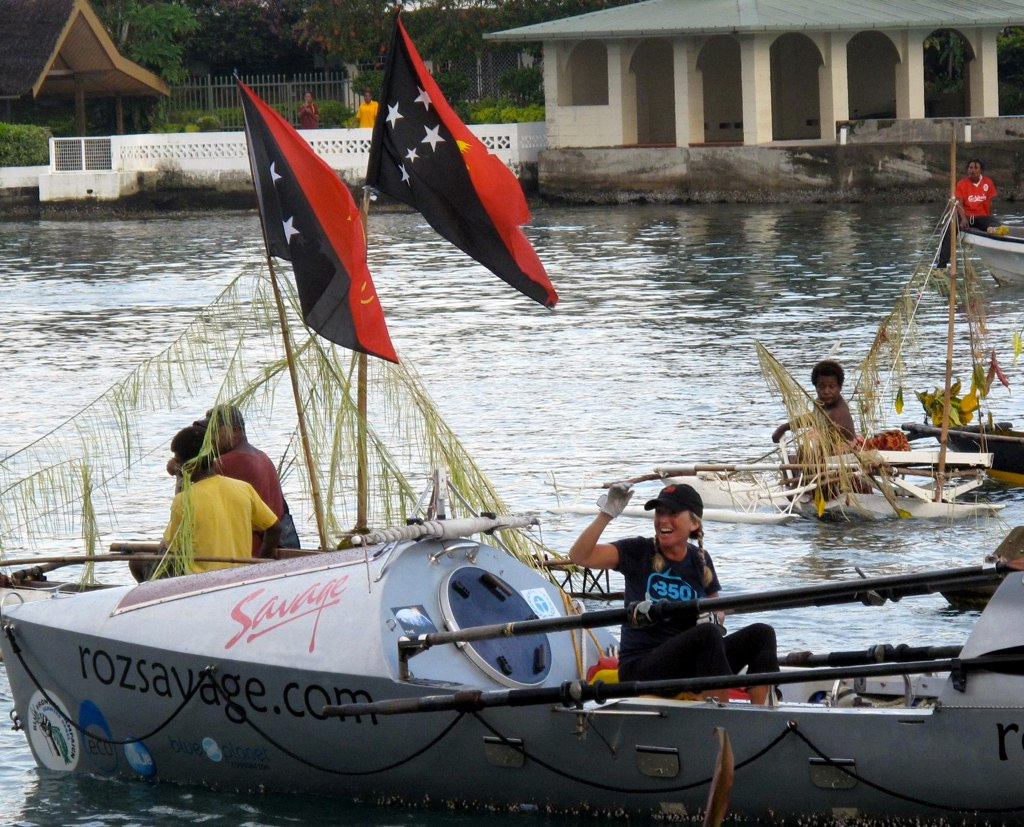
For eleven years, Roz Savage worked as a management consultant in London. Hers was a comfortable, unremarkable life. Or at least it was until 2003, when Savage had an unlikely epiphany: she was going to give it all up and row the world’s oceans to raise awareness about plastic pollution and other environmental causes. While Savage had done some rowing back at Oxford, the idea seemed like a crazy one — so crazy it just might work.
A decade later, Savage is a Yale World Fellow, a battle-tested environmental leader, and, oh by the way, the first woman to row solo across the Atlantic, Pacific, and Indian Oceans. Sage Magazine’s Stephanie Stefanski caught up with Savage to talk about elusive “movement moments,” how women can make change happen, and why the Iron Lady is actually a great role model (politics aside).
Sage: How did you start rowing? Where did this idea come from?
Savage: I wanted to have an adventure, to assert my self-sufficiency. In one very brief and precise moment, this crazy idea came to me. The universe, my subconscious, whatever you want to call it, one day clobbered me over the head with this rather unexpected answer about rowing across oceans to raise environmental awareness.
I immediately thought ‘that’s perfect’, and then I immediately thought ‘that’s absolutely insane.’ For a week I tried to talk myself out of it but it just seemed like the perfect idea. If I didn’t do it, then what was I even trying to do with my life? I was asking all these questions, I had an answer – was I going to ignore it?
Sage: How did you keep yourself pushing forward throughout your voyage?
Savage: There was stubborn pride – I told everyone I was going to do this so I couldn’t quit. There was a sense of obligation to all the people who had supported me, to the people who’d help me acquire my boat, to the people who worked on my boat.
I used dozens of tricks to keep myself motivated. There was the fear of going back to the office — I would rather do anything but that. I would daydream about this wonderful hotel in Antigua where I was going to stay when I arrived. Psychologically, I don’t know how I got through it. I didn’t even have any sound entertainment. Since then, the audiobooks have been an absolute godsend. Without that, you just kind of go completely into yourself and that can be quite uncomfortable. But I’m okay with it — I know myself quite well after three and a half months of complete solitude.
I blame it on my parents. They’re both Methodist preachers, and I think I grew up with this concept that you should have a vocation in life, that it’s important to be of service in the world. I was in denial about that for a long time, but I’ve reached that age where you not only acknowledge the fact that you are your parents’ child, but you actually become quite proud of your parents and what they gave you.

Sage: In your TED Talk, you say that one of your biggest challenges was your pre-conceived idea of an “adventurer.” Have you had any difficulties being a woman in the fields of adventure and environmental advocacy? What advice do you have for anyone else seeking to start his or her own adventure?
Savage: I’ve occasionally been asked if I’ve suffered any prejudice in a predominantly male world of adventure, and it’s impossible for me to answer because I’ve never been a man in the world of adventure. I have nothing to compare it with. I suppose I’ve never thought of myself in those terms.
People sometimes ask me, who are my role models? There is one I have very ambivalent feelings about – Margaret Thatcher. Despite her politics, she was a strong woman succeeding in a male world. Although there were certain masculine aspects to her character, she would also play up the feminine side – she would absolutely use it. I think it helped me at a formative age to have a Queen and a female Prime Minister. I don’t think I internalized that feeling that the whole world revolves around men.
Sage: It’s a very different experience from what we have in the United States, where our presidents have, of course, always been men.
Savage: I was talking to some American friends about this, and they said it came as no surprise that there was an African American president before a female president, because African Americans received the right to vote before women did. It’s fascinating. I think we forget how far women have come. I was born in the sixties, and even then women were such second-class citizens!
I recently attended a workshop with a women’s environmental network called the Pleiades. We talked a lot about female leadership, and my contribution to that discussion was that we tend to assume that women should be in positions of leadership, and we get riled up when we see all the CEOs being male and the politicians being male. I suppose my question is: what do we really want to achieve? If we have more women in leadership positions, how do we think that’s going to change things?
Sage: That question doesn’t get asked much. What do you think the answer is?
Savage: Rodrigo Canales, from the Yale School of Management, was recently talking about how, in a corporate hierarchy, the people who are actually the real innovators tend to be the people in the middle. It’s not the people at the top because they’re too high-profile; they have too much to lose to take risks. It’s not the people at the bottom because they don’t have the resources. It tends to be that the people in the middle who have the flexibility and the perspective to come up with an idea, pilot it in a small arena, and, if it works, start rolling it out. It might be the CEO, or the department, who takes credit for it, but it tends to be those little people who can actually create change.
So do we really want to be the leaders? If we genuinely want to generate change, then maybe we’re actually better off being in the middle. It’s up to everyone to make up his or her own answer to that question, but I think it’s just worth questioning the assumption that we should have more women in leadership roles. If what we want to do is actually solve problems, then maybe we would be more effective where we are.
Sage: How do you think you, personally, can most effectively be an agent of change?
Savage: I think of myself as being a spider — I know people in many organizations, countries, and levels of various hierarchies, politicians down to grassroots to NGOs to corporations. Maybe I could be more effective by weaving my web up and down, horizontally and diagonally, between these people, sewing ideas and trying to draw people together, to form collaboration, network, and, dare I say it, a movement. Could we actually start to build a cohesive, sustainable movement?
One of the documents I read for the Yale Panel on Climate Change Communications was on how to build a movement —it’s about forging relationships, creating a vision, and finding the “movement moment,” which is when circumstances conspire to create an opportunity. If there’s somebody there with a plan, that’s what people will be drawn to. We live in increasingly uncertain and unstable times — with the financial system toppling, with democracy not looking too rosy — and if there does come a “movement moment,” I would love to think that someone has a plan.
Sage: Is that someone you, do you think?
Savage: When I look around the world, I realize that most of the global leaders are either my age or older. That probably means that they don’t actually know much more than we know. On one hand, that’s terrifying – deeply terrifying because you want to think that these people really know what’s going on. In a way, it’s quite empowering as well – they’re not doing such a great job, so what’s to say that we can’t generate some ideas that might actually be better than their ideas?
I think I tend to always assume that other people know better than I do about what’s going on in the world. But why should I keep quiet about my ideas? They might not be any worse than anyone else’s ideas. If you have a good idea, pilot it. Don’t go all out and declare it to the whole world, because there’s a very good chance you’ll end up looking like a real idiot. Test out your idea, give a few presentations, run it past people, see if they engage in it, if it resonates with them. If they go, “What are you talking about?” then you go back to the drawing board. But I really do feel like we’re in unchartered waters, and it’s the blind leading the blind in some ways. Social media is a good example – there isn’t a right way or a wrong way of using social media. If you can find some creative and innovative way of using it, you can really communicate with people and engage them.

Sage: Speaking of social media, how has it supported your environmental mission? How do you see it playing a role in your next mission?
Savage: I need to decide what my mission is, and then choose the social medium accordingly. I think if I were only going to do one form of social media, it would be my blog because the people who do read it are very engaged. If I ask questions, I get answers. If I can just get my readers to think more deeply and to talk about the topics in my blog, then the blogs and those discussions will live on. I write at least as much for my own benefit as for other people’s. When I was on the ocean, I found writing to be extremely therapeutic. It gave me some perspective.
Sage: Your time at Yale is ending in December. What goals did you hope to achieve while at Yale as a World Fellow? Did you achieve these goals?
Savage: I didn’t know exactly what I wanted to get out of my time, but I knew that I was really curious – I’m a real believer in following your curiosity and seeing where it leads you. I came to Yale with three goals: to extend my global network, to have ‘time out’ to study, and to have the experience of being at Yale. It all seems to be working out really well; I feel like I’m achieving my goals and so much more. I don’t just mean the other World Fellows, and I don’t just mean the professors — I’m talking about the undergraduates, the graduates, and the Yale and wider New Haven communities. I feel like everything is just meshing together in a really beautiful way that I couldn’t have engineered if I had tried.
All photos courtesy of Roz Savage.